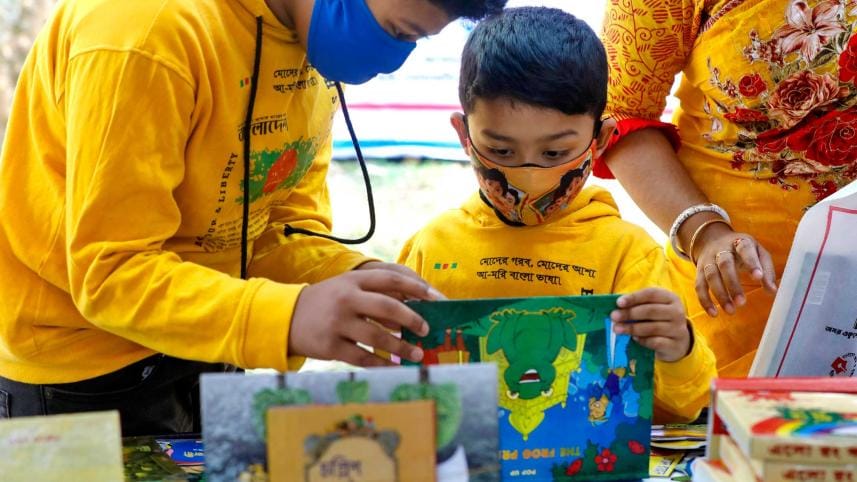Boi Mela is bringing kids to books. We can take this further.

"During school holidays, my coaching centre is closed. I encourage students to read books, play or do things they really enjoy. But most parents enrol them in some other coaching centres during their break," says a schoolteacher in Dhaka.
Most parents in Bangladesh view success in exams to be the most important thing in their children's lives. This is not conducive to their holistic development. Children are also spending a disproportionate amount of time online. Many are developing problems with their eyesight and experiencing delayed speech development. It has become common that parents are often busy with smartphones and hardly have time to pay attention to children even when they need it. In this context, it is a welcome relief that children are visiting the Ekushey Boi Mela with their parents and buying books.
Reading books is essential for developing children's imagination, analytical skills, concentration, communication, etc. It can also be a joyous experience. Parents should start reading books to children when they are a few months old. Giving books as gifts during birthdays and festivals helps in developing reading habits from a young age. Children should be given the opportunity to read books that they are interested in, instead of being influenced to read texts of specific genres. Once they find reading to be a pleasurable activity, they will explore other genres of their own accord. Any questions a child may have about books should also be encouraged and entertained.
Parents decide all aspects of their children's lives including food, clothing, toys, leisure activities, etc. Hence, it is their responsibility to provide guidance to children on the optimum usage of electronic devices. In addition to reading, parents should engage children in sports and creative activities which will ensure the latter's holistic development. Moreover, parents and adult family members must limit their own use of electronic devices. Children should receive uninterrupted attention from parents, without the interference of smart devices.
A lot of experimentation is going on worldwide with the size, shapes, illustration and overall production of children's books. Some are being printed on soft cloth to help babies and toddlers become familiar with the experience. Traditional fairy tales are also being rewritten to make them more appealing to the children of today.
Some parents living in Dhaka have said that while their children read English books, they are not at all interested in Bangla books, as their content and quality fail to attract them. While it is important to read good-quality books published in other languages, we should ensure that children read books in their mother language as well. Children of different ages think and feel differently, and their reading speeds vary, too. New issues in society should be considered while writing books for children, so that they find them relevant and enjoyable. As such, books should be categorised by age. In addition to the content, the illustration and print must be of high quality. Children already have access to a lot of visual products, and books have to compete with digital imagery to appeal to them. Writers, illustrators, editors and publishers thus have to perform effectively to create good-quality content. Though a few publishers are trying to improve the quality of their products in Bangladesh, many children's books are of compromised quality.
Once publishers invest in improving the quality of children's books, parents must be willing to buy those. These days, many parents are spending a lot on their children's clothes, food, on eating out or for travelling. Why should they also not have a monthly budget for buying books, then? The right books can be just as rewarding and entertaining as a video game or a trip outdoors.
There are opportunities to make our Ekushey Boi Mela more child-friendly. Stalls' layouts should be done in a way that children are able to browse through the books easily. There should be facilitators who will engage children properly. The decoration of the stalls could also be done more creatively to appeal to them. Activities could be organised so that they can interact with their favourite and new authors.
The Boi Mela should offer a space to facilitate activities that will help children begin to love books. Events should be conducted where children can participate in writing and illustration activities, take part in storytelling, etc. They can also dress up like their favourite characters. But we should not have to wait for Boi Mela to promote children's books. Storytelling sessions and interesting activities centred around books should be organised in bookshops and other academic, social and cultural venues all year round if we are to create readers for our future. School- and community-based libraries could also play a vital role in developing children's love for lifelong reading.
Laila Khondkar is an international development worker.




 For all latest news, follow The Daily Star's Google News channel.
For all latest news, follow The Daily Star's Google News channel.
Comments